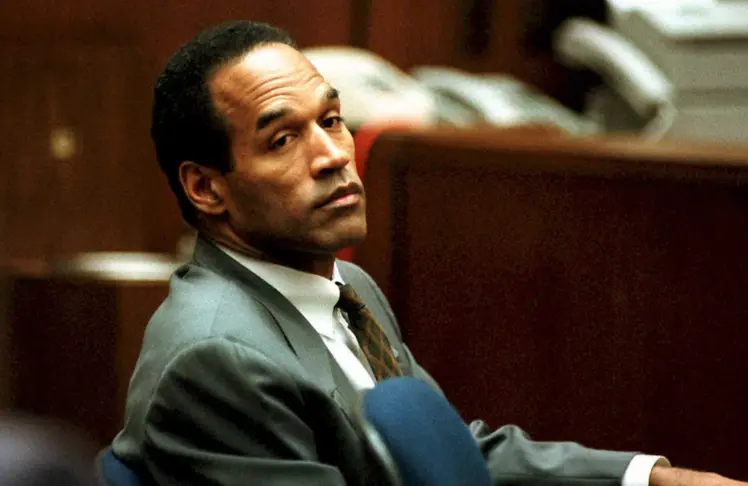
By Dakin Andone and Ray Sanchez, CNN
(CNN) — O.J. Simpson, the former NFL star and broadcaster whose athletic achievements and fame were eclipsed by his 1995 acquittal in the brutal killings of his ex-wife Nicole Brown Simpson and her friend Ron Goldman, has died of cancer, his family announced Thursday on X. He was 76.
A post from the “Simpson Family” on Simpson’s verified X account Thursday morning said: “On April 10th, our father, Orenthal James Simpson, succumbed to his battle with cancer.”
“He was surrounded by his children and grandchildren. During this time of transition, his family asks that you please respect their wishes for privacy and grace.”
Simpson’s prostate cancer diagnosis was made public about two months ago, Pro Football Hall of Fame President Jim Porter said in a statement. The Hall of Fame player had received chemotherapy treatment.
While Simpson was a highly decorated athlete – winning the 1968 Heisman Trophy as a senior running back at the University of Southern California before playing for the NFL’s Buffalo Bills and later the San Francisco 49ers – he became perhaps one of the most controversial figures of the late 20th century after he was charged with the murders of his former wife and her friend.
A jury found him not guilty in a trial that saw America’s fascination with celebrity collide with its centuries long struggle with race, as well as issues of class, policing and criminal justice. Those themes – and the judge’s decision to allow the trial to be televised – coalesced in what many called a “Trial of the Century” that held the country’s attention in a vise grip for nearly nine months before evolving into a cultural touchstone.
In 1997, another jury unanimously deemed Simpson liable for Brown Simpson’s and Goldman’s wrongful deaths in a civil lawsuit brought by Goldman’s family and ordered him to pay $33.5 million in damages.
Simpson maintained his innocence. But by 2016, polling showed most Americans believed he was guilty.
Simpson eventually ended up behind bars in an unrelated case, serving 9 years of a sentence of up to 33 years following his conviction on charges related to a 2007 armed robbery in Las Vegas in which he and others tried to steal at gunpoint of what Simpson said were pieces of his own sports memorabilia.
He was granted parole in 2017, telling the Nevada parole board: “I’ve done my time. I’ve done it as well and as respectfully as I think anyone can.”
More recently, Simpson had revived his idol-scale notoriety on Twitter, where he frequently posted videos with his thoughts on football and politics for his nearly 900,000 followers.
‘The greatest player anyone ever had’
Orenthal James Simpson was born to Eunice Simpson, a nurse’s aide, and Jimmie Lee Simpson, a custodian and cook, on July 9, 1947, in San Francisco, where he spent the early years of his life in the Potrero Hill housing complex.
Despite contracting rickets at an early age, forcing him to wear leg braces until he was about 5 years old, Simpson’s athletic skill was apparent early, and he spent most of his time at the local recreation center.
“It was those years, between 8 and 16, where I developed what athletic skill I had,” Simpson told Rolling Stone in 1977. “I think I spent more time at the Center than I did at home or at school.”
But the young Simpson also had several run-ins with the law. As a teenager, he joined a series of San Francisco street gangs and was arrested several times, once after getting into a fight, he told the magazine, calling it “just a part of living” in a low-income neighborhood.
His prowess as a young sportsman aside, Simpson’s grades in high school did not endear him to recruiters for collegiate football teams. Simpson had planned to join the US Army, Rolling Stone reported. But he abandoned that idea when a friend returned home from Vietnam after losing a leg. Instead, Simpson enrolled at City College of San Francisco, where he played football and ran track.
He scored 54 touchdowns in two years, People magazine reported, catching the eyes of recruiters at other schools, including USC, where his talents reached new heights: He set the NCAA single-season rushing mark in 1968, the same year he won the Heisman Trophy by what was then the largest-ever margin – an honor that would stand for more than five decades.
“Simpson was not only the greatest player I ever had – he was the greatest player anyone ever had,” USC head coach John McKay once said of Simpson, according to ESPN.com.
Simpson rose to the NFL the following year as the first overall draft pick by the Buffalo Bills. But the first few years as a pro were difficult for Simpson as Bills coaches opted not to make him the crux of their offense. That changed when head coach John Rauch was replaced in 1972 with Lou Saban, and Simpson soon was setting records again – in 1973 becoming the first back in history to rush for over 2,000 yards.
“I was in the locker room all by myself right before the game ended,” he told The Washington Post of crossing the threshold. “I started walking around thinking how I couldn’t wish to be anything more or anyone else. I was part of the history of the game. If I did nothing else in my life, I’d made my mark.”
Simpson went to the 49ers in 1978 and retired after two seasons. But he didn’t do so quietly.
Throughout his athletic career, Simpson had dabbled in acting and soon became a commercial pitchman at a time African American athletes rarely if ever got endorsement or merchandise deals. TV spots for car rental company Hertz showed him racing through airports, and he also acted on TV and in movies, including “The Naked Gun” films, and worked as a sportscaster for ABC and NBC.
It all helped him cultivate an image as affable and charismatic. “I want people to like me,” he once told People Magazine. “I think that’s my biggest motivation.”
One marriage ends and a volatile one begins
Simpson married his high school sweetheart Marguerite Whitley in 1967. They had three children: Arnelle, Jason and Aaren, who would drown in a pool in 1979.
The couple separated in 1978, nearly a year after Simpson met 18-year-old Nicole Brown, who was then working as a waitress at The Daisy, a Beverly Hills nightclub. They moved in together soon after, and Simpson and Whitley divorced in 1979.
Simpson and Brown married February 2, 1985, and would go on to have two children: Sydney Brooke Simpson in 1985 and Justin Ryan Simpson in 1988. But their relationship was said to be volatile, and their years together were rife with allegations of domestic violence and reports of abuse.
In one instance on New Year’s Day 1989, police were called at 3:30 a.m. to the Simpson home, where Brown Simpson – with a split lip and a black eye – told them, “He’s going to kill me,” the Los Angeles Times reported, citing a police report. She alluded to past calls to police, saying to officers, “You never do anything about him. You talk to him and then leave.” Simpson eventually pleaded no contest to spousal battery.
The couple separated in February 1992, when Brown Simpson filed for divorce. Despite reported efforts at reconciliation, they remained apart.
His ex-wife and her friend are killed
Then on June 13, 1994, Brown Simpson, 35, and Goldman, 25, were found stabbed to death after her dog led a neighbor to the bloody scene at her Brentwood, California, home.
Simpson, who flew to Chicago that night and checked into a hotel hours later for a promotional engagement, was an early suspect, in part due to the domestic violence charges. He returned to Los Angeles, where police handcuffed him and questioned him before his release. Within days, he was charged with Brown Simpson’s and Goldman’s killings.
Despite an agreed-upon plan to surrender to police, Simpson failed to turn himself in and vanished, only to reappear hours later in a white Ford Bronco driven by his friend, Al Cowlings. By that time, Simpson’s attorneys had said he might be suicidal.
Helicopters followed overhead as police chased the Bronco in a low-speed pursuit broadcast across the hectic Los Angeles area as Simpson reportedly held a gun to his head. While the football legend surrendered to police that same day, the chase – watched by some 95 million people – became a prelude to the larger-than-life trial to come.
It was a blockbuster case: Simpson, who pleaded “100% not guilty,” assembled a who’s who of defense attorneys for a team that sought to raise doubts about how evidence was handled.
They also accused then-Detective Mark Fuhrman of racial bias, tapping into deep mistrust between the Los Angeles Police Department and a Black community inflamed just a few years earlier by the police beating of motorist Rodney King. Fuhrman testified he had not used the N-word in a decade, then pleaded no contest to perjury charges and after retiring wrote a book casting himself as a victim of wider cultural problems.
The Simpson prosecution – lead by Marcia Clark and Chris Darden – zeroed in on the domestic abuse and DNA evidence, including that on a bloody glove found at the crime scene that matched another at Simpson’s property.
The trial reached a zenith when Darden asked Simpson to put on the gloves. Simpson struggled, and defense attorney Johnnie Cochran used the moment to boil the case down: “If it doesn’t fit, you must acquit.”
Reaction to the not guilty verdict was largely split along racial lines: At the time, 62% of White people surveyed believed him guilty, while 66% of African Americans believed him not guilty, a CNN and Time Magazine poll showed. Additionally, 65% of African Americans believed Simpson had been framed.
Public perception shifts as Simpson toys with saga
Those opinions would change over time. By 2014 – even before ESPN’s landmark documentary “O.J.: Made in America” masterfully reexamined the case through the lens of Simpson’s race – a CNN/ORC poll found 53% of Black people surveyed said the murder charges against Simpson were either “definitely true” or “probably true.”
Simpson continued officially to maintain his innocence. But he at times appeared to toy with the public’s perception of the case: He penned a book titled, “If I Did It,” that was promoted as a hypothetical first-hand account of the killings. The publisher initially canceled its run amid widespread criticism, but it was published in 2007 under the title, “If I Did It: Confessions of The Killer,” after a judge awarded the rights to Goldman’s family, with proceeds going toward the millions of dollars Simpson had failed to pay in the civil judgment.
Simpson similarly – and again, hypothetically, he said – described the killings in detail in a 2006 interview meant to serve as a companion to the book. That interview was held for years before airing in 2018.
“And I remember I grabbed the knife – I do remember that portion … – and to be honest after that I don’t remember, except I’m standing there and there’s all kind of stuff around and …” he said, before his voice trailed off.
This is a developing story and will be updated.
The-CNN-Wire
™ & © 2024 Cable News Network, Inc., a Warner Bros. Discovery Company. All rights reserved.















